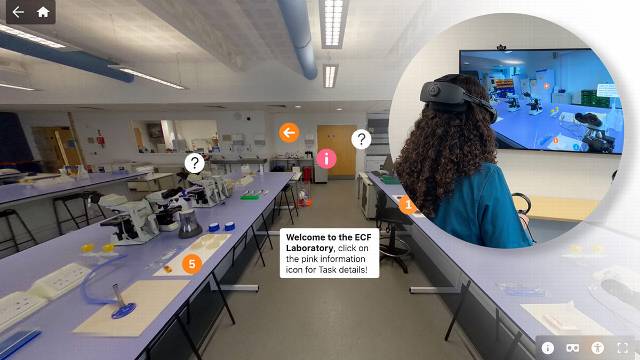
Rapid change and an unprecidented situation can be stressful for anyone. At present, it's difficult to know what tomorrow might bring and precisely how to deal with that. What we do know is that none of us are alone in this and, by coming together to help one another, we can make it through as a strong and united Harper community.
We caught up with Student Services to ask for their top tips on how to look after your mental health during Covid-19 and to offer some reassurance that it's okay not be be okay.
Top tips from the Wellbeing team
1. Breathe
This sounds obvious, but at times of stress and anxiety we may not notice how fast or irregular our breathing has become. Anxiety is the body's defence mechanism to keep us safe in times of perceived danger.
Take. Slow. Deep. Breaths.
It tricks the nervous system into thinking any “danger” has passed and you should feel calmer. Tell yourself you are safe in this moment.
2. Keep in touch with one another
While this may be different to usual, connecting with people is a great way to feel good. Talking about how you are feeling often highlights that we are not alone in these emotions. Equally, asking for help is not a sign of weakness and confiding can often lighten the burden you might be feeling.
Set up a virtual coffee morning, game night or cocktail hour! Do something that makes you laugh - laughing helps reduce feelings of stress. We may be physically isolated but we don’t have to be socially isolated.
3. Stay in the present
So much at the moment is out of our control. It’s tricky but keeping perspective about the current situation and monitoring your media exposure will keep anxiety in check. If we can focus more on what we can control - our own self-care, moving our bodies, cooking lovely meals - it calms our stress. Re-framing a negative situation into a positive one can be very helpful even if it’s not always easy to do.
To help focus on the here and now, try meditation apps like Calm or Headspace and make some time for online sporting classes or even yoga like Lucy! As something she used to love, she now has the time to bring it back into her life as a positive moment in her day that makes all the difference.
4. Sleep and routine
Keeping a routine in your day helps to feel in control and manage anxiety while rest helps you recover.
Adjusting your academic schedule is a new challenge we are all facing, so knowing the time of day you are most efficient and where in the house you get most work done is a must. It may be there isn’t much space and there’s a bit of juggling in your house too but do your best to have a calm work area.
If you are more motivated in the morning but this dwindles in the afternoon - go with it. It’s probably counterproductive to force yourself to work all day, achieve very little and then feel bad, especially if you can work productively for a whole morning and get more work done. Instead, do something else in the afternoon that boosts your mental health like listening to a podcast, doing relaxation or nurturing a forgotten hobby.
It’s probably to be expected that our sleep pattern is a bit disrupted at the moment. Where you can, try and limit caffeine after dinner, and keep to the same time of going to bed and waking to differentiate between daytime and night, the week from the weekend.
5. Faith
Many students have approached our University Chaplain, Libby, concerned about adjusting the way in which the pray, reflect or seek spiritual connection during a time of social distancing and self-isolation.
If we find ourselves unable to attend our usual places of worship, how do we connect with the divine aspect; the Big Beyond who is within and around us? We all connect with God or the Big Beyond in a variety of ways, just as we have different styles of learning. We call these Spiritual Styles. Some of connect spiritually through words, some through actions, some through images, some through our emotions. Keeping our usual rhythms of reflection and worship are really helpful, whether it is praying in the morning, or taking time to download a talk or sermon – these all help to feed the spiritual within us.
Libby suggests the use of prayer and meditation apps in line with your faith; the Daily Examen to pause and reflect on the day; to go outside where you can and observe your natural surroundings; or take a moment each day to listen to music and enjoy being fully present.
6. Be kind
Now isn’t the time to be getting frustrated with yourself for things you should have done or be doing. Be kind to yourself.
You might not be as productive as you want to be but being hard on yourself won’t help that. Break up academic work into smaller chunks so it’s more achievable. Give yourself breaks and time to do things that make you feel good. Motivation is probably something that’s more of a challenge at the moment. Lucy advises to write a to do list each morning that is realistic for the day. It helps her focus and achieve something even if she doesn't get it all done.
If lists aren't your thing, Lesley suggests making a colourful timetable, incorporating wellbeing and self care activities alongside fitness. Making the most of the time you do have and achieving little and often is more important than burning yourself out.
If you can, take a daily walk in the fresh air while practicing social distancing, or log on to NHS Fitness studio for free workouts you can do at home. Moving our bodies is brilliant for improving our mood and overall wellbeing. Also, think about activities you can do whilst at home like preparing a meal you have wanted to try but haven’t found the time for or listen to a new podcast.
Importantly, if you take any medication, make sure you have enough of these and order any repeat prescriptions in good time.
Overall, the team's overarching message is: "Remember, it’s ok if you are not coping 100%, we were not prepared for this and we need time to adjust and find a way through."
For further help and advice from the team, please see our Student Services page for information and contact details. To see more from students and how they are learning to cope with the changes caused by Covid-19, please see here.
 Blog: Trio of visits start historic year for Development and Alumni Relations department
2026 is set to be a bumper year for the Development and Alumni Relations Department at Harper Adams - as the University prepa …
Posted
Today
Blog: Trio of visits start historic year for Development and Alumni Relations department
2026 is set to be a bumper year for the Development and Alumni Relations Department at Harper Adams - as the University prepa …
Posted
Today





